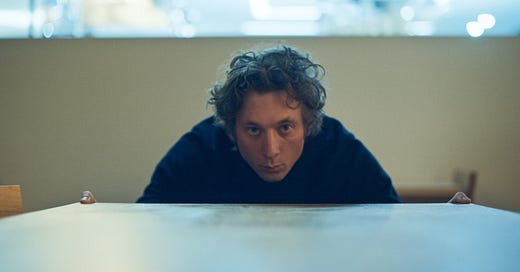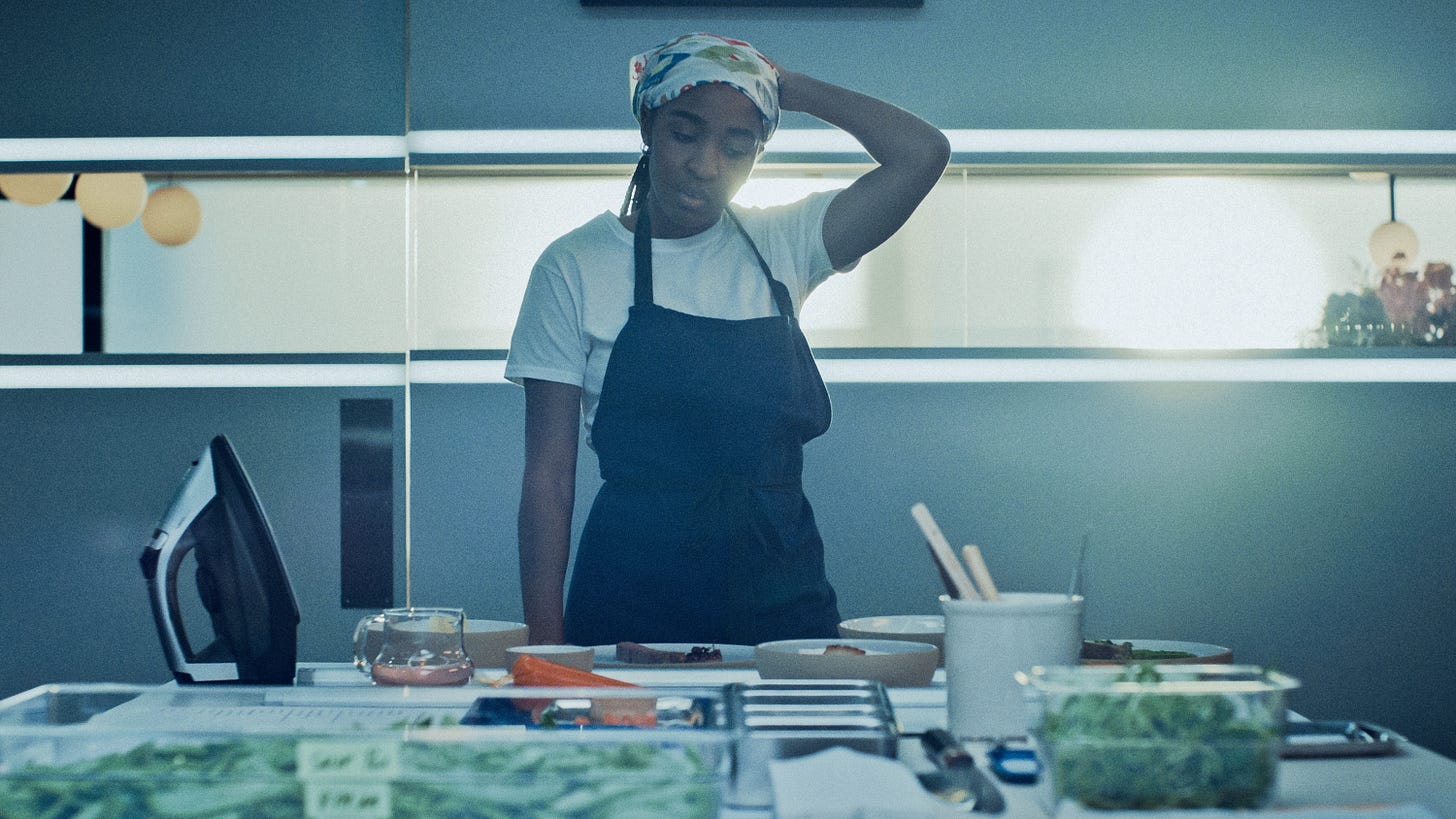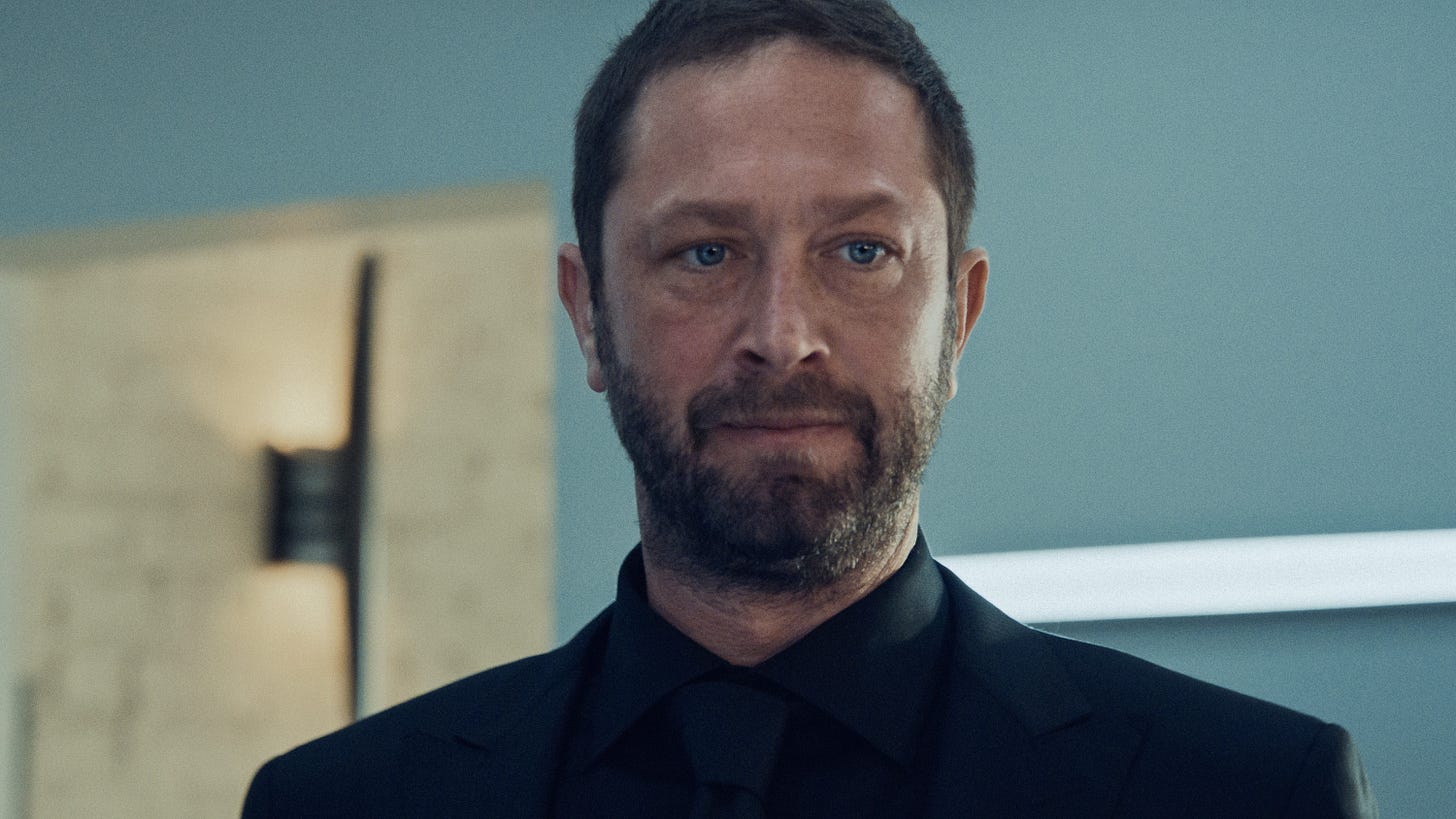Review: The Bear, "Tomorrow" / "Next" / "Doors" | Season 3, Episodes 1-3
Can our tortured chef do it with a broken mind?
Welcome to Episodic Medium’s coverage of The Bear season three. While this first review is free for all subscribers, subsequent reviews covering a few episodes at a time will only be available to paid subscribers. $5 gets you access to the reviews and discussions and helps support our work. For more information, check out our About Page.
“You don’t think I can do it?”
At the end of its second season, I made peace with The Bear’s binge release structure. Although I still argue that it makes more business sense to release it week-to-week, and it’s unfortunate that we miss out on the opportunity to reflect on the show on an episodic basis in a space like this one, I ultimately agree that the show is written, directed, and perhaps most importantly edited with the understanding that its viewers will be moving from episode-to-episode in rhythm. The story of how The Beef became The Bear wasn’t ten linear segments, but rather ten lyrical, character-driven stories where time took a back seat to vibe. The show still had its triumphant moment where all the hard work paid off, but the circuitous journey there hit harder when everything was fresh in mind.
If there’s any question about whether that was going to change in season three, there shouldn’t be after “Tomorrow.” An impressionistic non-linear journey into Carmy’s brain, the episode weaves in and out of his life’s work from the moment he left Chicago to try to make his dreams come true to the phone call where that life was erased by Mikey’s death. In the aftermath of The Bear’s operationally successful, emotionally disastrous soft opening, Carmy is doubling down on everything he’s ever known about being a chef. With his dream so close at hand, his mind is drawing on past experience without rhyme or reason, jumping around in time and space as he struggles to channel it all into a menu. It’s incredibly disorienting, which is of course the point: Carmy’s mental health struggle means that there’s no easy answers to how to get The Bear where he thinks it needs to be (a Michelin star, it turns out).
The irony is that one of the “Non-Negotiables” he comes up with in the midst of his frantic remaking of their menu is that “less is more,” but his brain can’t take that advice. It would be easy if he could just channel one of his mentor figures as the situation warrants. Tina is struggling to figure out a recipe? Pull on his very first culinary teacher, whose patience and kindness gave him a space to learn. Marcus is struggling to keep up with a particularly precise dessert preparation? Channel Olivia Colman, who returns to offer stern guidance mixed with quiet affirmation and support. And while there might not be a scenario where he should ever emulate how Joel McHale’s David treated him, there’s some space for self-reflection there if he could keep it separated from everything else.
We have seen Carmy be capable of these things, but the problem is that he doesn’t believe he is. There’s too many emotions flying around for anyone to see it this way, but because we spent the first half-hour of the season inside his head, I feel confident saying that the “Non-Negotiables” are not there to hold everyone else to Carmy’s standard. They’re there as a form of self-discipline, a twisted idea of what it takes to make it as a chef that foregrounds his most traumatic experiences in the interest of never repeating them. I’m not saying that Carmy isn’t an asshole, or that he’s being reasonable—I just believe at the end of the day that he’s more worried about failing than being failed, and everyone else is just collateral damage to his self-destruction.
When I decided I’d break down and write about this season in more detail, I wasn’t sure how to approach it, but these episodes flowed together in such a way that I’m probably going to just divide the season up into four groups—1-3, 4-6, 7-9, and then the finale—and write my way through each block. In this case, it seemed weird to stop after one episode when so much of the aftermath of last season was left unresolved—we certainly see some other characters over the course of the episode, but the lack of a clear chronology made it hard to follow any one of them. The biggest bit of lore we get is when Sydney got to experience Carmy’s cooking in New York and witnessed his rebellion against his boss, although there’s also a reinforcement of Carmy and Natalie’s bond as they said goodbye at the airport that resonates. Everything else feels like we’re stuck in the time loop in Carmy’s head, which is alarming—sure, John Mulaney is there, but there’s something relentless about the experience that made me wonder how differently it played with commercial breaks for those without an ad-free plan.
“Next” goes in a different direction entirely, locking us into a single room as the staff react to Carmy’s new world order. It’s not technically a bottle episode, since it starts at Sydney’s apartment to give us a moment of respite from inside Carmy’s mind, but it’s still mostly a single scene taking place in the restaurant’s kitchen, albeit with a very different dynamic compared to the chaos of “Review” back in season one. It’s written very much like a play, with new characters entering and reacting to the ongoing conversation that becomes more and more complicated with each new face. The order is very purposeful: it’s Nat first so that Carmy’s in a more vulnerable place, it’s Sydney after so that there’s a chance for the two chefs to work out the dynamic of their partnership, and only then is it fine for Richie to come in and turn it into a screaming match.
The Bear’s binge model is in some ways a cheat, because it allows them to ignore the typical expectation of resolving tensions left over from last season. We know from “Tomorrow” that Carmy is dealing with big feelings around Claire, and we get a discussion of it in “Next,” but then the story is almost entirely absent in the following episode. Similarly, the words Carmy and Richie exchanged through the door of the walk-in are still too fresh in their mind for them to deal with it, but we’re three episodes into the season and they’re just letting it fester. The binge release mirrors the experience of running the restaurant: everything in “Next” seems crazy to almost everyone on staff, but they aren’t really in a position to fight it given that service starts in eight hours and they need to get to the farmer’s market. The binge model means that it might be another three—or heck, seven—episodes before there’s the time necessary to take a breath and has things out.
The only person who isn’t freaked out by it all is Marcus, who probably should be concerned but has to throw himself back into his work in the wake of his mother’s death. The way the fight stops when Marcus enters reminds us that no one here is a bad person: Carmy doesn’t want Marcus to follow his own example from the aftermath of Mikey’s death, but Marcus finds some solace in the idea that the thing which kept him from his mother’s bedside in her final moments is going to become as big as their dreams. The Carmy-centric premiere means there’s not as much room for the show’s other character arcs to really come to the surface, but the moments we do get are a reminder that they have a stake in this too (in Sydney’s case literally, depending on what that DocuSign says).
“Next” may not have been as intense as “Review,” but it captured the raw emotion between Carmy and Richie through a lot of shouting, and I was relieved when we were moving out of the kitchen and back into the actual operations of the restaurant. However, any relief was short-lived given that “Doors” is an unrelenting deluge of stories from the restaurant’s first six weeks. There’s material for an entire season of sitcom stories here—I don’t know that I want a show where there’s an entire episode about Carmy freaking out that the handmade bowls are different sizes, but the way the show burns through these moments runs counter to how a workplace sitcom would conceive of this space. As I wrote a few weeks ago, I don’t believe the genre debate around the show will ever be resolved, but “Doors” is an incredibly funny episode of television even if it’s hard to argue that these three episodes collectively are interested in “comedy” given how “Tomorrow” sets the tone for the season as a whole. Oliver Platt’s delivery of “It’s dystopian butter?” is still making me laugh, and Fak’s interactions with the clientele are a reliable source of delight. But the sheer amount of time that passes means that the sum total of this comedy is a broader takeaway: The Bear is a successful restaurant being run into the ground by the mental struggle symbolized by the season’s first episode.
There’s no mystery about what’s wrong with The Bear’s finances: the seats are filled, but Carmy’s constantly changing menu and uncompromising focus on quality means that they’re spending too much to turn a profit. There probably could have been an entire episode about trying to add half-a-turn to the restaurant instead of just a quick vignette, but it’s a band-aid for a bullet wound. No one is arguing that Carmy is wrong that some of the best restaurants change their menus every day, and it doesn’t even seem like anyone is willing to suggest that a Michelin star isn’t worth their time. But this is not a sustainable way to run a restaurant, and that’s clear given how every single person is on edge—there’s not a single character who’s at peace, and while there’d be no show if they were just happily running a restaurant, we can’t live in this space forever either. Every time there was a pause for a commercial, I yearned for the commercials some of you were watching, regretting that I would get only a few seconds of black screen before being thrown back into the fire.
What worked best about “Doors,” returning us to the question of the binge release, was how you could see Carmy fighting the struggle we became a part of in the premiere. The scene where Carmy is about to take over for Tina before Sydney steps in is a great example: we know what he’s drawing from in his past when he does that, but he watches Sydney closely, and witnesses the kind of patience he struggles to emulate but appreciated so much as a younger chef. Those moments are fleeting, and by the end of the episode he’s on the verge of a panic attack flashing back to everything that drove him to this state of affairs in the first place. And while Sydney is right that she’s not his babysitter, the simple truth is that he can’t do this by himself, and everyone’s going to have to figure out their way to modulate this moment in order for The Bear to survive.
I believe The Bear will survive, given that The Bear is an award season juggernaut and having them outright fail seems like it would limit the show’s storytelling possiblities. But even if this season brings Carmy to a healthier place, there’s still always going to be that drive to improve, along with the aspirations and dreams of the staff as a whole. I’m a little frustrated at how little of an arc Sydney gets here, but this feels like a transitional season in terms of her place at the heart of this restaurant—this may be something she had and lost, but Carmy comes to this from a place of trauma, and they have to work through that before the next hurdle. And similarly, characters like Richie and Marcus that got such rich episodes last season feel a bit buried in the ensemble, but Marcus does get his speech at his mother’s funeral, and I have no doubt that Richie’s going to get his moment as the season progresses.
But for now, the viewer and the characters are all equally trapped in Carmy’s broken mind, and the question becomes what has to happen to find a way to fix it (or, more realistically, confront it in a way that lets him start that process on his own).
Stray observations
Was there a scene last season about Carmy being particular about what pens he uses? Or did I just write that in my head while I saw him writing out his list? Seems like something he’d do.
We get enough glimpses of dates to suggest this goes from mid-May to early July, which means that Nat should be due pretty soon given she flags the baby as two months away when she has her 4pm conversation with Carmy in “Next.” I’ll be curious to see if we do some bigger time jumps to get her back to work, or if we’ll slow down and focus on stories outside of the restaurant.
It’s a touch sad that Allen White and Edebiri literally had to clarify that their characters don’t do anything romantic this season to cut off the shipping conversations, but there’s really no romantic dynamic between them here: Carmy is wholly focused on (read: haunted by) Claire, who we see during “Tomorrow” but who doesn’t actually have a conversation with him at any point in the six weeks we skip over. Sydney, meanwhile, doesn’t follow up on her flirtations with Marcus, but she seems more focused on dealing with her cohabitation with her father.
Maybe it’s just that Showtime recently confirmed they’re going full Muppet Babies with their Dexter prequel, but I shouted “Batista!” at the screen when David Zayas was at Mikey’s funeral, having failed to register previously that Liza Colon-Zayas is married to him in real life. An uncredited cameo, it would appear.
I’m proud of Carmy for trying to quit smoking, but I regret to say that after eleven seasons of Shameless, I just can’t wrap my head around Jeremy Allen White chewing gum instead of dragging on a cigarette. Feels wrong.
We got returns from John Mulaney, Gillian Jacobs, Will Poulter, and Olivia Colman in “Tomorrow,” and I just spent a lot of the episode marveling at the logistics of having to shoot in Copenhagen, California (The French Laundry), Chicago, and New York for the same episode (I kind of presume they shot the latter in Chicago). The difference in cost between episodes one and two must have been staggering.
Some of the cuts to commercial seemed really jarring even without commercials, but the most strange was the one right after Richie spots a fork on the ground (I get that symbolism) but then spots a woman’s purse? It seemed like there was a bit missing, but maybe I just don’t get it.
The montage of restaurant and hotel workers at the beginning of “Next” was perhaps longer than it needed to be, but I like the idea of grounding the show in the actual work involved, which helps anchor our characters (as well as the rest of the staff, like the dishwashers) when we get to the chaos of “Doors.”
Did we really need the “Part III” chyron?
Welcome to Episodic Medium’s coverage of The Bear season three. I had sort of hoped that I would have had these all written in advance with screeners, but those screeners never arrived in my inbox, meaning that I’m working on this in real time. Accordingly, I’m working without a clear schedule, but my expectation is a review every couple of days. I know this means delayed conversation, but I’m hopeful that we’ll have some meaningful dialogue at some key intervals of the season, and encourage you to comment even if you’re “behind” so that others coming behind you can engage with past you’s reflections.







Thanks for breaking this season into chunks and not just doing a single spoiler filled review--or no review at all. While I personally wouldn't be against watching all of these quickly to dive into the conversation, my wife (who likes the show more than me, to be fair) prefers spreading them out. So it'll be nice to check in here every few episode batches.
Anyway, I just wanted to say my wife and I could not stop laughing at the scene where Fak tries to serve the mirepoix broth but only pours the broth before taking the tray back to the kitchen. So funny! Well shot too.
I gotta admit, I was frustrated by episode one not moving things forward. A character piece is all well and good, and I deeply admired the craft that went into it (imagine being the composer for this episode!), but as you said I didn't feel like we learned very much new.
That said, my heart leapt into my throat when they revealed that Sydney was the customer at the end. That was really lovely, and felt like an earned bit of mythmaking.